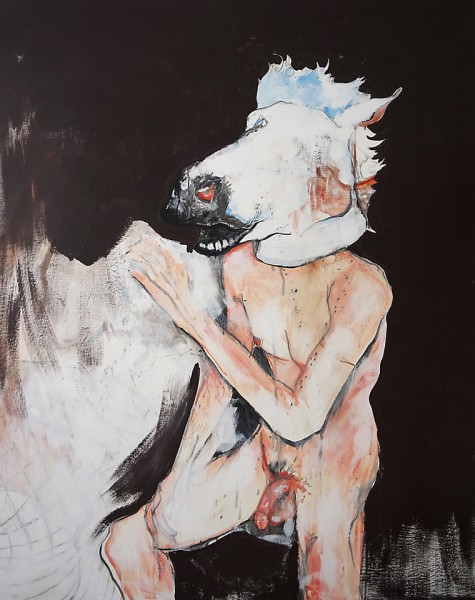We keep Walter in a cave because he is ugly. He wasn’t always, but over time his features all started fighting each other and his eyes got really small and his nose got really big and his lips were always purple and his ears moved down his head so they were almost on his neck and his eyebrows became little dots, just dark enough to be a distraction and his pores got wide open and his moles grew hair so we hid him away to stop scaring the other children.
We toured the local forests to find the right spot. A place where he could have a view of a waterfall. Where he can see the whole sky open and blue and at night he can count the stars. We built a door for the cave. We included an opening to give him food and big enough for him to put his hand out to feel when it rains.
It may seem cruel, but it’s for his own good. It’s like how we keep Sondra in the yard because she’s wild the way she clucks like a chicken and chases flies and sometimes hides under the hedges and jumps out at us drooling and growling. And it’s like how we keep grandpa in the attic because he’s so stupid. We do this to protect the ones we love.
We’re nothing like the farmer who cut off his horse’s nose to spite the face and cut off the face to spite the head and cut off the head because he had already gone so far there was no stopping. He shaved the mane and cut off the tail for good measure and now that horse wanders the forest, the same forest where Walter lives, he moves around, bumping into trees and stumbling over squirrels and roots.
Rumor has it, what led the farmer to do all that cutting, was that horse jumped in the lake every night, chasing the reflection of the moon. Chomping at the waves as though he was trying to bite into and swallow the reflection. And we say, if we had a horse that stupid we’d tie him to a log and let him float away down the river, not because we are cold, but because it would be the best for all involved. Maybe the farmer felt he was being kind to maim the horse like that. To set it free to wander the woods without temptation of a tricky reflection in the water. But he was wrong.
From his cave, Walter can hear the chatter of the forest at night. He can hear them tell stories of what lies at the bottom of that lake. It is food. It is a feast made for any man who’s smart enough to find it. That’s what Horse was looking for, they say. And Walter can hear them gnashing their teeth and smacking their lips as they tell him how good it is, the fruit and the meat and the cheese, all of it just waiting at the bottom of the lake. The candy and the pastries and the wine and the cheese and they fall out of the tree limbs where they were dancing. Oh, the cheese they squeal as they roll on the ground, ignoring the pine needles and dirt getting all stuck in their fur and feathers.
Walter watches the forest night, he puts one hand on the cold rock of the wall and one hand on the wood grain of the door and he puts his eye against the hole in the door and he sees the sky, big and open, and he sees the stars. And he sees the waterfall and the way it thrashes and breaks the water. And he sees the calm part of the lake, the little bay where the horse jumped in night after night. And under the water he sees the feast. From here he sees what must be a full cooked turkey, a cornucopia spilling fruit and vegetables, he sees a wheel of cheese, glowing and alien. It’s almost in his reach. The stories he could tell if he could just get a taste.
We put Walter in this cave because he is ugly, but we fear the isolation is making him dumb. He tells us stories about feasts and food. We put medicine in his meals now. We sedate him. We wait until he sleeps before we open the door to change his socks and underwear. We give him a new blanket and fresh bedding.
Walter lets his eyes adjust to the dark. His pupils dilate. His ears tremble. He puts one hand on the stone wall. He puts the other hand on the wood grain of the door and he puts his eye to the hole. He sees the sky, big and open. And he sees the stars. And he sees the waterfall and the thrashing water and he sees the bay. And in the calm water he sees the reflection of the moon. And he sees a shadow charging into the lake, he tries to warn the body, bumbling and tumbling toward the water, he wants to shout that there is nothing in that water. It is the moon playing a trick. It is the forest telling lies. Walter holds his breath even as the shadow is breaking the reflection apart.
Walter puts his eye to the hole in the door and he sees the sky and the clouds and he sees the waterfall and the water thrashing and the calm bay and he sees us hiking up the hill with hands filled with fruit and bread and honey and wine and cheese. And he knows we will hold his hand and we will tell him he is here because he is just too beautiful for the world.



 The SmokeLong Grand Micro Contest (The Mikey) is now an annual competition celebrating and compensating the best micro fiction and nonfiction online.
The SmokeLong Grand Micro Contest (The Mikey) is now an annual competition celebrating and compensating the best micro fiction and nonfiction online.